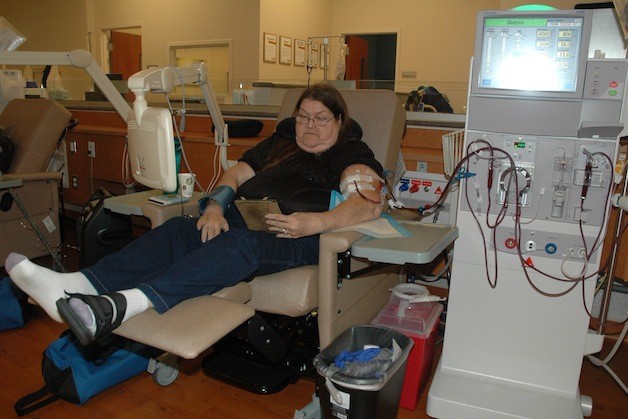MARYSVILLE — Marysville might not seem like a short commute from Burlington, but for dialysis patient Patrice Romero, it’s more convenient than going to Oak Harbor.
“At least I can take the freeway, rather than winding my way along mountain roads and Deception Pass,” said Romero, who comes to the recently opened DaVita Pilchuck Dialysis Center at 1250 State Ave.
Romero is at the clinic three days a week, five hours a day. She was connected to DaVita through the National Kidney Foundation, since she can’t afford the insurance.
Will Penrose, group facilities administrator for the seven DaVita clinics from West Seattle to Whidbey Island, noted that DaVita has a dialysis clinic in Everett, and the Puget Sound Kidney Center in Smokey Point also offers dialysis. But given that Romero’s clinic hours are typical for his dialysis patients, even those short distances are prohibitive.
“In terms of hours and days per week that they have to come into a clinic to do this, it’s practically a part-time job for them, just to be able to receive life-sustaining care,” Penrose said. “That’s why we work around their lives as much as we can, with three shifts each day we’re open. We’re concerned with their clinical outcomes, but also with their quality of life.”
Of the Marysville clinic’s 10 patients, eight had previously gone to DaVita’s Everett clinic, including Charles Moorhead of Tulalip and Glenn Kumura of Lake Stevens. Like Romero, they agreed that the hours spent sitting their chairs and receiving dialysis was the toughest part, but they all credited the clinic’s staff with making the experience as pleasant as possible.
“Jeanne [Rather] is my favorite person,” Romero said, referring to the Marysville clinic’s facilities administrator. “She arranged for me to come here from Oak Harbor.”
Rather and her staff of one nurse and two patient care technicians serve patients Mondays, Wednesdays and Fridays, but she expects staffing to expand to 18. Likewise, the clinic has eight dialysis chairs, but has the capacity to expand to 14, which would allow the clinic to serve as many as 48 patients.
Rather explained that the clinic not only offers in-clinic hemodialysis, such as Romero, Moorhead and Kumura receive, but it also provides patients with the two-week training for at-home peritoneal dialysis, which affords them more flexibility in their work and life schedules.
“We educate patients about what dialysis entails, and what their options are, so there are no misconceptions,” Rather said.
Penrose added: “Even outside of the dialysis treatments, we do social work and surveys to determine what areas they’re experiencing difficulty with, whether it’s insurance issues or making doctor’s appointments, and we work with them to overcome those things.”


